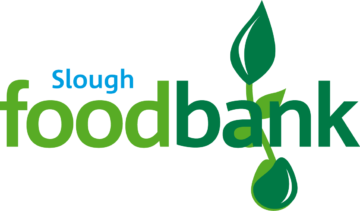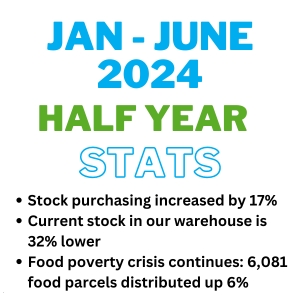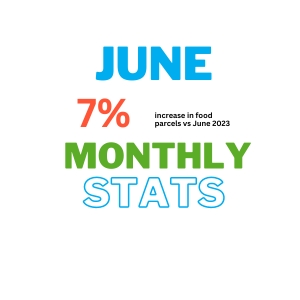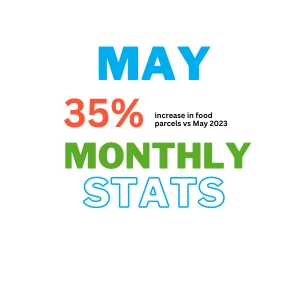News
Food poverty crisis at its highest as Slough Foodbank publishes full year statistics for January – December 2023
18th January 2024
Share this: facebook link twitter link linkedin link
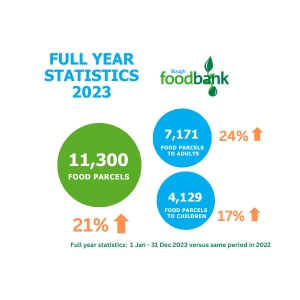
Food poverty crisis is at its highest as Slough Foodbank publishes statistics showing that more emergency food parcels were given out during 2023 than any previous year, with a 21% increase in the number of food parcels distributed versus same period in 2022.
Full year stats released – 01 January 2023 to 31 December 2023 versus the same period in 2022.
| 12 months 2023 Jan – Dec |
12 months 2022 Jan – Dec |
Percentage change | |
| Adults | 7,171 | 5,801 | 24% increase |
| Children | 4,129 | 3,521 | 17% increase |
| Total | 11,300 | 9,322 | 21% increase |
Number of food parcels provided by month
| Month |
Number of food parcels 2023 |
Number of food parcels 2022 |
Change |
| January | 1050 | 678 | 55% increase |
| February | 917 | 663 | 38% increase |
| March | 1218 | 731 | 67% increase |
| April | 846 | 709 | 19% increase |
| May | 742 | 849 | 13% decrease |
| June | 937 | 742 | 26% increase |
| July | 848 | 573 | 48% increase |
| August | 878 | 619 | 42% increase |
| September | 804 | 888 | 9% decrease |
| October | 893 | 886 | 1% increase |
| November | 1008 | 768 | 31% increase |
| December | 1159 | 1217 | 5% decrease |
Graph showing number of food parcels by month Jan – Dec 2023 vs 2022, along with dates of Government Cost of Living payments (CLP).
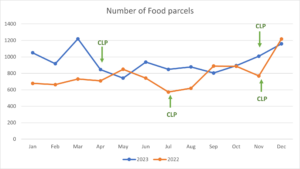
Total number of food parcels provided over the last 5 years
| Year | Total number of food parcels | % change on previous year |
| 2019 | 4,783 | 19% increase |
| 2020 | 6,350 | 37% increase |
| 2021 | 7,360 | 13% increase |
| 2022 | 9,322 | 27% increase |
| 2023 | 11,300 | 21% increase |
Graph showing number of food parcels by year
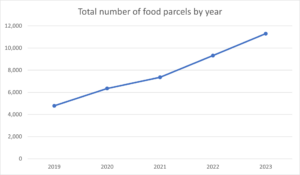
It’s a stark reality that year on year the increase in demand for Slough Foodbank continues – it’s not a trend that’s acceptable.
There was a 21% increase in the number of food parcels provided versus the same period in 2022. It’s clear from these figures, that for many in Slough, the cost of living crisis continues and families are being hit hard with a 17% increase in the number of children being fed.
More people are being dragged into debt and having to turn to food banks to survive. This escalating hardship creates dire consequences for individuals and the Slough community as a whole. Since July 2022, the UK government has used one-off cost of living payments to help people on low incomes, but the limitations of this approach are now clear. We see in our data that there is a dip in the need for food banks when each payment is made, however this respite only lasts between one and three weeks.
In October, along with Citizens Advice, we launched a new service in Slough to further help people in crisis. Citizens Advice workers run confidential sessions at the Foodbank’s Distribution Centres. This was a significant step – a long-term approach, helping people get the advice they need so they can reduce their reliance on crisis support, including the use of foodbanks, as their financial situation improves.
Many people who find themselves in food poverty crisis and need to use a foodbank have underlying issues relating to benefits, debt, low income, discrimination at work, housing, homelessness or ill health.
Having trained advisers from Citizens Advice East Berkshire (CAEB) dedicated to offering advice and information related to these areas is of enormous benefit ensuring that clients are getting all the support possible to help them out of food poverty.
Slough Foodbank Manager, Laura Cole commented:
“It is so disheartening to see the stats prove what we see first-hand in the distribution centres, the continuing deprivation in Slough leading to people facing food poverty crisis and turning to us, often as a last resort. We were hopeful that the cost of living payments would make a substantial difference, sadly the relief was temporary. Although it does show that with a little extra in their pockets people can afford to eat. That’s why we are supporting the Trussell Trust’s campaign to ‘Guarantee our Essentials’ and that, at a minimum, Universal Credit should protect people from going without essentials such as food, household bills or travel costs.
With a 21% increase in food parcels, we are under real pressure to meet this demand both on supply of food, which we rely on donations for, as well as volunteers who sort food, prepare food parcels and serve clients.”
Slough Foodbank’s primary function is to supply a three-day emergency food parcel to those who suddenly find themselves in an unexpected crisis. In addition to food, we also supply basic toiletries and household products, as well as nappies, baby wipes and pet food if required.
We provided 1,300 SIM cards for clients to use in their mobile phone, each valid for 6 months with free calls and texts and internet data (20GB per month), which is important in helping people stay digitally connected and have access to the support they need.
We also provided 783 emergency fuel vouchers (an increase of 30%) for home gas or electricity for clients who qualify to receive food parcels, and who top up their meter at a pay point or a post office. This is to enable clients to cook the food we provide or heat their homes. The increase in fuel costs meant that many clients faced the tough decision over the winter months of whether to eat or heat their homes.
In December, we provided 383 Christmas Hampers to households to help bring a little joy to people struggling in food poverty crisis this Christmas.
If you would like to support Slough Foodbank please visit:
https://slough.foodbank.org.uk/give-help-2/
Notes:
Slough Foodbank has been providing emergency food parcels to people in food poverty crisis since 2010. The area we support covers from Taplow in the West to Colnbrook in the East, and from Gerrards Cross, The Farnhams and Iver, to Datchet and parts of Windsor. We operate 6 days a week, out of 5 distributions centres in Slough (town centre), Langley, Cippenham, Iver and Britwell.
Our statistics are a measure of volume rather than unique users. The data is collected using an online system recording each food bank voucher and the number of emergency food supplies provided to each adult and child.
For example, if a family of three were referred to Slough Foodbank twice in one year, this would count as six food parcels on the system because it would reflect six instances of a supply going to someone in the household. However, if a family of three were only referred to a Slough Foodbank once, this would count as three food parcels.
